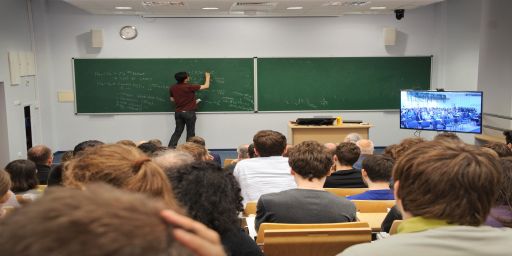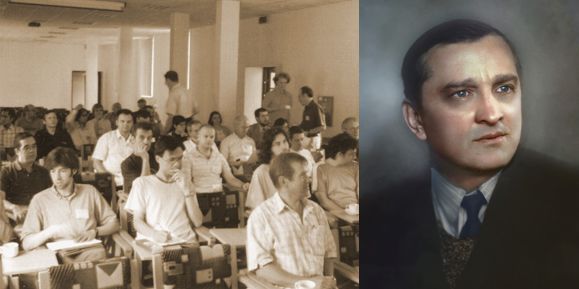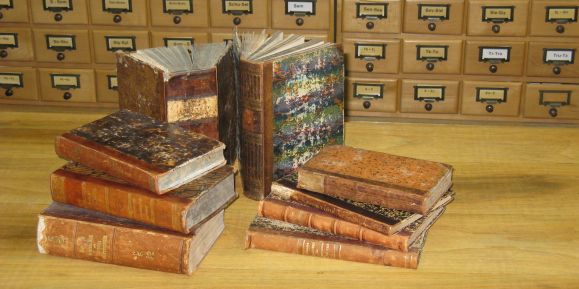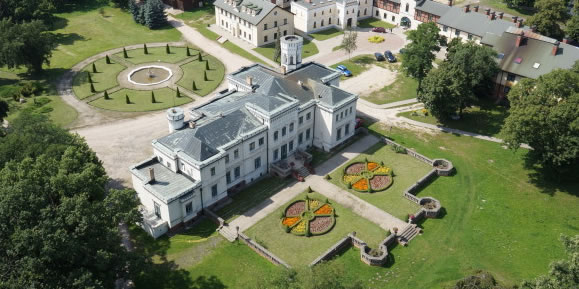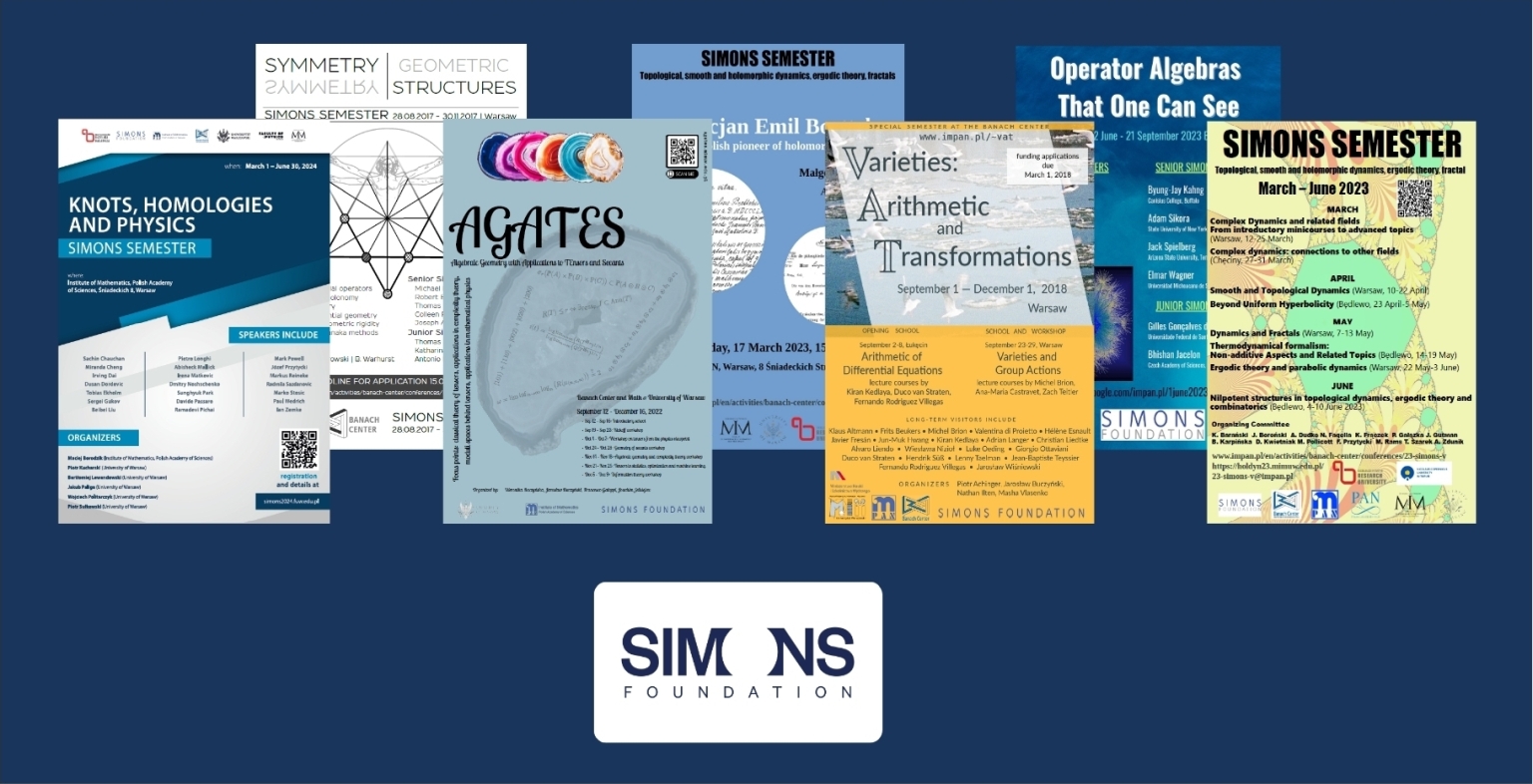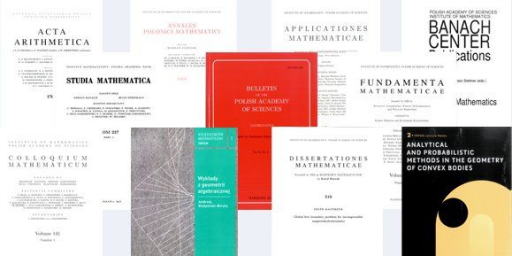Instytut Matematyczny Polskiej Akademii Nauk / Institute of Mathematics / Activities / Seminars in IMPAN / Noncommutative geometry
Academic year 2015/2016
12 October 2015, 10:15-12:00
FROM WORONOWICZ'S TANNAKA-KREIN RESULT TO EXAMPLES OF COMBINATORIAL QUANTUM GROUPS
Compact quantum groups are natural carriers of symmetry in the framework of C*-algebras. Just like the theory of C*-algebras can be seen as a non-commutative version of topology, compact quantum groups can be viewed as a generalization of compact Hausdorff topological groups. In 1988, Woronowicz proved a Tannaka-Krein result for compact matrix quantum groups. After recalling and discussing the beauty of this theorem, we point out how it opens a door to combinatorial methods in the theory of quantum groups. In particular, we apply this Tannaka-Krein machinery to obtain Banica and Speicher's orthogonal easy quantum groups (their work from 2009). Then we apply it to unitary easy quantum groups (joint work in progress with Pierre Tarrago) and other versions of the "easy" type quantum groups (joint work in progress with Guillaume Cébron).
MORITZ WEBER (Universität des Saarlandes)
12 October 2015, 14:15-16:00
PULLING BACK ASSOCIATED NONCOMMUTATIVE VECTOR BUNDLES
For any finite-dimensional representation V of a compact quantum group acting freely on a unital C*-algebra A, we can form an associated finitely-generated projective module AV over the fixed-point subalgebra B of this action. The module AV is the section module of the associated noncommutative vector bundle. Given an equvariant C*-homomorphism f from A to A', we get the induced K-theory map f* from K0(B) to K0(B'), where B' is the fixed-point subalgebra of A'. Using Chern-Galois theory, we show that f*([AV])=[A'V]. As an application, we combine this formula with higher-rank graph C*-algebra technology and index pairing computations to prove that the noncommutative line bundles associated via the diagonal U(1)-action on the multi-pullback quantum odd-dimensional spheres are pairwise stably non-isomorphic. In particular, we conclude that the tautological line bundles over the multi-pullback quantum complex projective spaces are stably non-trivial. The same reasoning and conclusions hold for noncommutative line bundles associated to Vaksman-Soibelman quantum spheres. (Partly based on joint work with David Pask, Aidan Sims and Bartosz Zieliński.)
PIOTR M. HAJAC (IMPAN)
19 October 2015, 10:15-12:00
THE NONCOMMUTATIVE KÄHLER GEOMETRY OF THE FULL FLAG MANIFOLD OF Cq[SU(3)]
The talk will begin by defining noncommutative complex and Kähler structures for differential calculi. A covariant differential calculus for Cq[F3], the full quantum flag manifold of Cq[SU(3)], will then be introduced, and its complex and Kähler structures classified. It will be shown that the dimension of the calculus and the number of classified structures are the same as in the classical case, and that the calculus restricts to the Heckenberger-Kolb calculus on Cq[CP2]. The ring structure of the cohomology ring of the calculus will then be shown to satisfy a q-integer deformation of the classical Schubert calculus rules.
(Joint work with Petr Somberg.)
RÉAMONN Ó BUACHALLA (IMPAN)
19 October 2015, 14:15-16:00
PARTITION WREATH PRODUCTS OF QUANTUM GROUPS BY FINITE GROUPS
Classical wreath products are special cases of semidirect products of groups. They are related to an action of a group G by permutations on several copies of another group H. A quantum version of this construction was introduced by Julien Bichon, with G and H replaced respectively by a quantum permutation group and an arbitrary compact matrix quantum group. The quantum version was later studied by Banica, Bichon, Collins, Lemeux and Tarrago. It is important to note that, even if G is a classical group, the construction of Bichon leads to a genuinely quantum group. In this talk, I will present a new categorical approach which allows us to construct so-called partition wreath products for when G is an arbitrary easy quantum group and H is a finite group. Thus we simultaneously generalise both the classical wreath products and quantum wreath products of Bichon. Joint work with Amaury Freslon (Paris Sud XI).
ADAM SKALSKI (IMPAN)
16 November 2015, 10:15-12:00
THE NON-COMMUTATIVE GEOMETRY OF DEFECTS
A diagrammatic calculus for finite real spectral triples is introduced. This calculus relates the axioms of non-commutative geometry with geometric properties of the diagrams. The diagram calculus determines a two-dimensional topological quantum field theory (TQFT) with defects. Conversely, defects in a TQFT determine a generalised notion of non-commutative geometry.
JOHN W. BARRETT (University of Nottingham)
16 November 2015, 14:15-16:00
QUANTUM SEMIGROUPS GENERATED BY LOCALLY COMPACT SEMIGROUPS
Among the main tools used to study locally compact groups are their group C*-algebras. Group C*-algebras can also be thought of as co-commutative function C*-algebras of locally compact quantum groups. It is natural to suppose that semigroup algebras would give rise in the same way to quantum semigroups. For semigroups, however, the situation turns out to be more involved: a natural semigroup algebra might be non-commutative even for an abelian semigroup, and the linear dual of a semigroup algebra need not be an algebra of functions on the semigroup. In this talk, we consider a subsemigroup S of a locally compact group G such that S-1S=G. We show that the C*-algebra C*(S) generated by the elements of S acting as translation operators on the Hilbert space L2(S) admits a co-commutative comultiplication that turns it into a compact quantum semigroup. It is important to note that the C*-algebra C*(S) is not commutative even when S is the semigroup of positive real numbers. Finally, we will argue that, for any semigroup S with nonempty interior, the comultiplication on C*(S) can be extended to the von Neumann envelope of C*(S). This is joint work with Marat Aukhadiev (Münster).
YULIA KUZNETSOVA (Université de Franche-Comté)
14 December 2015, 10:15-12:00
NONCOMMUTATIVE DIMENSION THEORIES FOR TOPOLOGICAL AND C*-DYNAMICS
Developments in the classification and the structure theory of C*-algebras in the past decade have highlighted the importance of an assortment of regularity properties. In particular, the regularity property of having finite nuclear dimension has been shown to play a pivotal role by a recent breakthrough of Tikuisis, White and Winter. This has spurred growing interests in the advances of noncommutative dimension theories, for which a focal challenge is to find ways of estimating nuclear dimension for crossed-product C*-algebras. To this end, various dimensions of dynamical nature have been conceived, including Rokhlin dimension, dynamical asymptotic dimension, amenability dimension, etc. Roughly speaking, these dimensions measure the complexity of the topological or C*-dynamical system that gives rise to a given crossed product. We will discuss some of these concepts, their relations, as well as generalizations and applications. The talk is based on joint works with Ilan Hirshberg, Martin Finn-Sell, Gabor Szabo, Wilhelm Winter and Joachim Zacharias.
JIANCHAO WU (Universität Münster)
14 December 2015, 14:15-16:00
COMPACT GROUP ACTIONS ADMITTING ASSOCIATED VECTOR BUNDLES
When a compact Hausdorff group G acts freely and continuously on a compact Hausdorff space X, one can associate to any finite-dimensional continuous representation of G a vector bundle on the quotient space X/G. In this talk, we explain how this construction can still be performed if freeness is replaced by a more general condition which we call “being of finite type”. We give several equivalent formulations of this condition in terms of the continuity of the associated bundle of stabiliser groups, in terms of the orbit type of the action, and in terms of Galois maps. This is joint work with P. Baum.
KENNY DE COMMER (Vrije Universiteit Brussel)
21 December 2015, 14:15-16:00
THE HOPF (CO)CENTER OF A HOPF ALGEBRA
The notion of the Hopf center and Hopf cocenter of a Hopf algebra is investigated using the extension theory of Hopf algebras. We prove that each of them yields an exact sequence of Hopf algebras. Moreover, the exact sequences are shown to satisfy the faithful (co)flatness condition. The Hopf center and cocenter are computed for the quantized universal enveloping algebra of a simple complex Lie algebra and for the Hopf algebra of the Drinfeld-Jimbo quantization of a compact semisimple simply connected Lie group. Joint work with Alexandru Chirvasitu.
PAWEŁ Ł. KASPRZAK (Uniwersytet Warszawski)
11 January 2016, 10:15-12:00
INDUCED REPRESENTATIONS OF LOCALLY COMPACT QUANTUM GROUPS: FROM E. WIGNER TO M. RIEFFEL
The theory of induced representations goes back to the 19th century (Frobenius). In the context of locally compact groups and unitary representations, it was rediscovered by G. Mackey (1947) who was inspired by a paper of E. Wigner (1939) on irreducible unitary representations of the Poincaré group. Next, M. Rieffel (1974) found an interesting generalization with the use of Hilbert C*-modules. Finally, in 2004, S. Vaes attempted to extend the theory to locally compact quantum groups. In my talk I shall present the main idea of Wigner’s paper and the development that led to the theory of induced representations in terms of Hilbert C*-modules. For any inclusion H<G of locally compact groups, I shall build a Hilbert C*(H)-module M implementing the induction procedure. Finally, I will show that the C*-algebra generated by M is related to a locally compact groupoid nicely constructed out of the inclusion H<G.
S. L. WORONOWICZ (IMPAN / Uniwersytet Warszawski)
11 January 2016, 14:15-16:00
ABSENCE OF CARTAN SUBALGEBRAS FOR HECKE-VON NEUMANN ALGEBRAS
Hecke algebras are algebras generated by operators Ts, with s in some generating set S, that satisfy the Hecke relation (Ts–q-1/2)(Ts+q1/2)=0. Hecke algebras are fundamental for the theory of quantum groups and have remarkable applications in Jones' knot invariants. After taking a GNS-representation, these algebras generate a "Hecke-von Neumann algebra", which was introduced and studied by J. Dymara. In this talk, we consider approximation properties and Cartan subalgebras of Hecke-von Neumann algebras. We prove that they are not injective and have the completely bounded approximation property. We also prove that they are strongly solid algebras, and therefore do not have a Cartan subalgebra. I will introduce these concepts in the first part of the talk.
MARTIJN CASPERS (Universiteit Utrecht)
18 January 2016, 10:15-12:00
The index class in K0top of a Fredholm complex of Hilbert spaces is invariant under finite rank (in fact, compact) perturbations of the complex. A K-algebraic invariant associated to such a complex is the determinant line of its homology groups, which has similar invariance properties to its index class. The perturbation isomorphism is a canonical isomorphism of the determinant lines associated to finite rank perturbations of the Fredholm complex. We will sketch a construction of perturbation isomorphisms and study their analytic properties. In particular, we will use them to provide a holomorphic structure on the determinant lines of the homology spaces over the space of Fredholm complexes, thus generalising the known construction (due to Quillen) in the case of a single Fredholm operator. Similarly to the six term exact sequence in topological K-theory, a morphism of Fredholm complexes leads to a torsion isomorphism of certain determinant lines, which turns out to be analytic with respect to the holomorphic structure described above. We will present some applications of these results to computations of the torsion of commuting N-tuples of operators, and a construction and computation of the Tate tame symbol as an invariant of the algebraic K-theory (more precisely K2alg) for not necessarily smooth complex curves. This is joint work with Jens Kaad.
RYSZARD NEST (Kobenhavns Universitet)
18 January 2016, 14:15-16:00
GROUP-THEORETIC PROPERTIES OF THE QUANTUM PERMUTATION GROUP S4+=SO-1(3)
Motivated by the question of A. Skalski & P. Sołtan concerning the inner faithfulness of S. Curran's map, we hunt for a description of group-theoretic properties of the quantum permutation group S4+ (or more generally, any Sn+). In particular, we revisit the work of T. Banica & J. Bichon on the subgroups of S4+. We fine tune some of their results, and also present novel ideas. The talk will be focused on the algebraic side of the theory of compact quantum groups. However, if time permits,
some of the related geometry and dynamics will be discussed too.
PAWEŁ JÓZIAK (IMPAN)
25 January 2016, 10:15-12:00
Motivated by examples obtained from conformal deformations of the Dirac operator and Dirac operators on quantum cones, we propose twisted reality conditions for the Dirac operator.
ANDRZEJ SITARZ (Uniwersytet Jagielloński / IMPAN)
25 January 2016, 14:15-16:00
Kazhdan projections are certain idempotents in group algebras whose existence characterizes property (T). Kazhdan projections are the main source of the few currently known counterexamples to various versions of the Baum-Connes conjecture. I will discuss a new construction of Kazhdan projections in the setting of uniformly convex Banach spaces. As one of the applications, we obtain a construction of new examples of ghost projections for warped cones over actions with spectral gaps. We expect that such warped cones are new counterexamples to the coarse Baum-Connes conjecture. This is joint work with Cornelia Drutu (Oxford).
PIOTR W. NOWAK (IMPAN)
22 February 2016, 10:15-12:00
A MONOIDAL VERSION OF TAKEUCHI'S EQUIVALENCE OF CATEGORIES
A basic result in the geometry of classical homogeneous spaces is the equivalence between equivariant vector bundles over a homogeneous space and the representations of the space's isotropy subgroup. Importantly, this is an equivalence of monoidal categories. Takeuchi showed that this equivalence has a direct generalisation for any quantum homogeneous space M. Explicitly, he established an equivalence between the category GMMod (left G-comodules endowed with a compatible left M action) and the category ModH (right H-comodules). However, this is not a monoidal equivalence. The most obvious reason for this is that GMMod does not have a monoidal structure. In this talk I will present two variations on Takeuchi's equivalence that overcome this problem, and briefly discuss some applications to the theory of differential calculi on quantum homogeneous spaces.
RÉAMONN Ó BUACHALLA (IMPAN)
22 February 2016, 14:15-16:00
THE K-THEORY OF C*-ALGEBRAS GENERATED BY q-NORMAL OPERATORS
A q-normal operator can be considered as a *-representation of the coordinate algebra of a quantum complex plane. This coordinate algebra does not admit a C*-norm which is consistent with the idea of the quantum complex plane as a non-compact quantum space. To study non-compact quantum spaces in the C*-algebra setting, one may apply S. L. Woronowicz’s theory of C*-algebras generated by unbounded operators. It turns out that the C*-algebras generated the q-normal operator depend only on the spectrum of its modulus. If the spectrum is the positive real line, we view the generated C*-algebra as the algebra of vanishing-at-infinity continuous functions on the quantum complex plane. In this talk, we compute the K-theory of C*-algebras generated by q-normal operators, determine generators of K-homology classes, and compute the index pairings. For the C*-algebra of continuous functions on the quantum complex plane, the K-groups and the index pairings are analogous to the classical counterparts, but in the other cases, the K0-groups can be rather degenerate.
ELMAR WAGNER (Universidad Michoacana de San Nicolás de Hidalgo, Morelia, Mexico)
29 February 2016, 10:15-12:00
INTEGRABILITY OF ACTIONS AND QUANTUM SUBGROUPS
I will present recent results relating the concept of an integrable action of a locally compact quantum group with the notion of a closed quantum subgroup. Using results about the canonical implementation of an action of a locally compact quantum group, I will show that closed quantum subgroups yield integrable actions, and subgroups closed in the weaker sense (so called Woronowicz closed subgroups) such that an associated action is interable are closed in the stronger sense. I will also describe results about characterization of compact and of open subgroups in terms of integrability. Next, I shall introduce definitions of the kernel and (closure of) image of a homomorphism of quantum groups, and the kernel of a quantum-group action. The talk is based on joint work with Fatemeh Khosravi and Paweł Kasprzak.
PIOTR M. SOŁTAN (Uniwersytet Warszawski)
29 February 2016, 14:00-15:45
ROKHLIN DIMENSION: TRACIAL PROPERTIES AND CROSSED PRODUCTS
We study compact-group actions with finite Rokhlin dimension, particularly in relation to duality and crossed products. For example, we show that ideals in the crossed products are induced by invariant ideals in the algebra. Under the additional assumption of so-called commuting towers, we show that taking crossed products by such actions preserves a number of relevant classes of C*-algebras, including: D-absorbing C*-algebras, where D is a strongly self-absorbing C*-algebra, stable C*-algebras, purely infinite C*-algebras, C*-algebras with finite nuclear dimension (or decomposition rank). Additionally, and under some technical assumptions, we show that finite Rokhlin dimension with commuting towers implies the weak tracial Rokhlin property, whence crossed products of tracially approximately finite dimensional (TAF) algebras are again TAF. In these proofs, one important technical tool is a certain local approximation of the crossed product by a (usually locally trivial) bundle over a compact space with a fiber stably isomorphic to the underlying algebra. Based on joint work with Ilan Hirshberg and Luis Santiago.
EUSEBIO GARDELLA (Universität Münster)
7 March 2016, 10:15-12:00
Dual groups have been introduced by Voiculescu in the 80s. Though somewhat similar to quantum groups, they have not yet been thoroughly studied. We will present some results about the unitary dual group, such as the existence of an analogue of the Haar state, and the study of a particular class of Lévy processes defined on it.
MICHAËL ULRICH (Université de Franche-Comté)
7 March 2016, 14:00-15:45
CAUSAL RELATION IN NONCOMMUTATIVE SPACES
Causality is among the most fundamental principles of physical theories. In classical physics, it has a rigorous formulation in terms of a partial order relation on the set of events, i.e. points of spacetime. However, quantum theory forces us into a non-local description, and the very notion of an event becomes vague. To lift the veil on the nature of causality in the quantum world, we proposed, with Nicolas Franco, a rigorous notion of causal structure in full generality of noncommutative geometry. It is defined as a partial order relation on the set of states of a (pre-)C*-algebra, and lives in the realm of Lorentzian spectral triples. In my talk, following a brief introduction into the classical theory of causality, I will present the notion of 'causality in the space of states' along with its noncommutative-geometric framework. The concept will be illustrated with two simple 'almost-commutative' models.
MICHAŁ ECKSTEIN (Uniwersytet Jagielloński)
14 March 2016, 14:00-15:45
EMBEDDING EXPANDERS IN GROUPS: CONSTRUCTION AND APPLICATIONS
I will present my recent construction of finitely generated groups containing isometrically embedded expanders. Such groups have many exotic properties. For instance, they do not embed coarsely into a Hilbert space, and the Baum-Connes conjecture with coefficients fails for them. The construction allows us to provide the first examples of groups that lack property A (i.e., they are not exact) but are still coarsely embeddable into a Hilbert space. Better still, these groups act properly on CAT(0) cubical complexes. To end with, I will also present some further applications of the main construction concerning aspherical manifolds and the asymptotic dimension.
DAMIAN OSAJDA (Uniwersytet Wrocławski/IMPAN)
21 March 2016, 10:30-12:15
FIXED POINTS OF COMPLETELY CONTRACTIVE MAPS AND CONVOLUTION OPERATORS ON QUANTUM GROUPS
The Choi-Effros product, granting the fixed-point space of a unital completely positive map a unique von Neumann algebra structure, is a key tool in the construction of the abstract Poisson boundary, generalising the classical concept of a probabilistic-type boundary for a random walk. I will discuss how replacing a completely positive map by a completely contractive map leads instead to a construction of a (weak *-closed) ternary ring of operators. Then I shall present some applications of the construction to the study of fixed-point spaces of convolution operators on classical and quantum locally compact groups. (Based on joint work with Pekka Salmi, Matthias Neufang and Nico Spronk.)
ADAM SKALSKI (IMPAN)
9 May 2016, 10:15-12:00
THE K-THEORY OF TWISTED MUTLIPULLBACK QUANTUM COMPLEX PROJECTIVE SPACES
Take the n-th tensor power of the Toeplitz algebra and divide by the n-th tensor power of the ideal of compact operators. This gives a quantum-odd-sphere C*-algebra C(Sq2n-1) equipped with a natural diagonal U(1)-action. Using the theory of higher-rank graph C*-algebras, one can prove that the U(1)-fixed-point subalgebra of C(Sq2n-1) is isomorphic with the C*-algebra of the multipullback quantum complex projective space PT(n-1). In this talk, I will theta-twist PT(n-1), analyze the multipullback structure of the twisted multipullback quantum complex projective spaces, and compute their K-groups. (Based on joint work with Piotr M. Hajac, Ryszard Nest, David Pask and Aidan Sims.)
BARTOSZ ZIELIŃSKI (Uniwersytet Łódzki)
9 May 2016, 14:00-15:45
Lp-MULTIPLIERS AND LACUNARITY FOR COMPACT QUANTUM GROUPS
In this talk, I will first give a brief introduction to the Fourier multipliers on Lp-spaces associated to compact quantum groups. In particular, I will explain some new and basic inequalities for bounded, but not completely bounded, multipliers on quantum groups. I will also define Λ(p)-sets for compact quantum groups, and discuss their existence, examples, and the role they play in lacunarity phenomena. Then I will prove that a subset of the set of irreducible representations of a compact quantum group is an interpolation set of bounded Lp-multipliers if and only if it is a Λ(p)-set.
SIMENG WANG (IMPAN)
23 May 2016, 10:30-12:15
Blackadar and Cuntz set out to define "a reasonable abstract notion of a smooth subalgebra of a [possibly noncommutative] C*-algebra which includes the standard examples" such as the algebras C∞(X) for X a compact manifold. Drawing from their motivations, in my talk I will present a certain class of differential algebras (in the sense of Parfionov and Zapatrin) endowed with a locally convex topology generalizing the standard topology of C∞(X). We call these algebras differential pre-C*-algebras (or DPC*-algebras for short). DPC*-algebras are examples of Arens-Michael *-algebras but they behave, in many respects, like C*-algebras. In particular, I will show that DPC*-algebras are closed under holomorphic calculus applied to any element and under C∞-functional calculus applied to normal elements that commute with all their derivatives. I will also provide some examples of these algebras as well as discuss their basic categorical properties.
TOMASZ MILLER (Politechnika Warszawska)
23 May 2016, 14:00-15:45
OPEN QUANTUM SUBGROUPS OF LOCALLY COMPACT QUANTUM GROUPS
The notion of an open quantum subgroup of a locally compact quantum group is introduced and given several equivalent characterisations in terms of group-like projections, inclusions of quantum-group algebras, and properties of quantum homogeneous spaces. Open quantum subgroups are shown to be closed in the sense of Vaes. Normal open quantum subgroups are proved to be in one-to-one correspondence with normal compact quantum subgroups of the dual quantum group. Finally, I will also discuss induction of unitary representations from an open quantum subgroup emphasising simplifications occurring in this case. (Based on joint work with Mehrdad Kalantar and Adam Skalski, and on work in progress with Mehrdad Kalantar, Piotr Sołtan and Adam Skalski.)
PAWEŁ KASPRZAK (Uniwersytet Warszawski)
30 May 2016, 10:30-12:15
RECONSTRUCTION PROBLEMS IN THE LIGHT OF NONCOMMUTATIVE GEOMETRY
I will survey the history of some reconstruction problems, and explain how they can be approached via noncommutative dynamical systems. This concerns the reconstruction of isomorphisms of number fields or curves from Galois groups, zeta functions and Hecke algebras, and the reconstruction of isometries of Riemannian manifolds and graphs from zeta functions. In this part, prerequisites from number theory will be kept to a minimum. Based on what happens in number theory, I will speculate on various ways in which reconstruction becomes possible by using finer noncommutative spaces than C*-algebras. I will also present more details on the proof of reconstruction of a curve over a finite field from a (noncommutative) dynamical system, assuming more familiarity with class field theory and L-series. The talk is based on joint work with Xin Li and Matilde Marcolli.
GUNTHER CORNELISSEN (Utrecht University)
30 May 2016, 14:00-15:45
NONTRIVIALITY OF EQUIVARIANT MAPS
The classical Borsuk-Ulam theorem in algebraic topology maintains that an odd map from a sphere to itself must be homotopically nontrivial. This idea can be generalized greatly in the topological setting, for example by replacing the sphere with a general compact space admitting a free action. Moreover, such results can be pushed through Gelfand-Naimark duality. This leads to a number of examples that make similar claims in the C*-algebraic setting: when a unital C*-algebra admits a free action of a compact (quantum) group, it is expected that equivariant maps must meet some nontriviality condition. I will present our recent progress on such problems, in particular toward resolution of the noncommutative Borsuk-Ulam conjectures of Baum, Dabrowski, and Hajac. (Joint work with Alexandru Chirvasitu.)
BENJAMIN PASSER (Washington University, St. Louis)
6 June 2016, 10:30-12:15 and 14:00-15:45
COHERENT SHEAVES ON QUANTUM PROJECTIVE SPACE
PART 1, PART 2
In 2006, Heckenberger and Kolb defined a de Rham complex and a Dolbeault complex for the quantized irreducible flag varieties. Based on the category of differential graded modules of the Dolbeault differential graded algebra, we construct a category of coherent sheaves on quantum projective space. We show that this category is equivalent to the proj-category of the q-commutative polynomial algebra, a category often studied in noncommutative algebraic geometry. This talk is based on joint work with Jan Šťovíček.
RÉAMONN Ó BUACHALLA (IMPAN) PART 1
ADAM-CHRISTIAN VAN ROOSMALEN (Universiteit Hasselt) PART 2

